 |
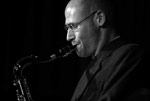 Lee Russo 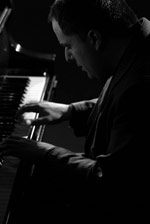 Dave Solazo 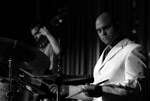 Mike DelPrete & Joe Barna 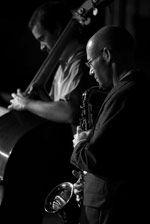 Mike DelPrete & Lee Russo 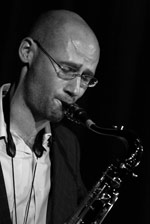 Lee Russo 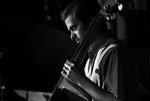 Mike DelPrete photos by Andrzej (Andre') Pilarczyk click here for more |
LEE RUSSO QUARTET “A Place For Jazz” The Whisperdome, First Unitarian Society Schenectady, NY September 26, 2008 by J Hunter “We are definitely the most sensitive band,” Joe Barna informed the appreciative crowd at the Whisperdome. “We don’t do autograph sessions – we hug.” In all seriousness, the Lee Russo Quartet is all about the personal side, and all about the intimacy of music and performance. That doesn’t mean they don’t swing, and it sure doesn’t mean they can’t kick serious butt when the occasion calls for it. But it’s the players’ relationship with their music – and with the subject matter that drives most of the material – that keeps things intimate even when this excellent batch of local talent gets to rocking out. Rather than going full-bore from the jump, the Russo Quartet started slowly, building the crowd’s comfort zone with the lilting waltz “Carros-elle.” Barna opened his composition in the clear, using brushes to paint swirling sounds as a prelude to Russo’s initial run at the melody. Mike delPrete took the first solo, which was beautiful except for the fact that it was well down in the mix; this improved somewhat as the first set went on, but it wasn’t until after Intermission that delPrete’s bass got completely out from under Dave Solazzo’s piano. Still, it was worth leaning forward to hear the whole of “Ivory Romance” (another Barna composition), as Mike rolled out fat lines that were both melodic and substantive. Although the band was billed as “the Lee Russo Quartet”, Barna’s imprint on the band was substantial. He acted as frontman for the first set, and the lion’s share of that set was composed by Barna. “Romance”, which was written for Lee Shaw, was part of a cluster of tunes Barna had composed with specific people in mind: “A Wel-Don Blues” was a greasy funfest dedicated to Jerry Weldon, while the Coltrane-esque “The Purpose” was a musical affirmation for a young musician struggling with the bewildering changes a career in music can bring. On all these tunes (and all the other tunes that followed), I wasn’t sure what I loved more: When Barna worked his kit like Ken Shamrock smacking someone around the Octagon (as Barna did on “Mobleyisms”, Russo’s smoking homage to early-influence Hank Mobley), or when Barna was all about the subtleties (as he was on the Charlie parker-in-Brazil send-up “Bossa for the Ornithologist.” As much as Barna lauded Russo for “his sound, his elegance, and his ability to control the band without telling them what to do”, Russo returned that admiration in spades. When Russo took over the mic for the second set, he told the crowd that he made his debut disc Trading Off (LRS, 2006) at Barna’s urging. The respect Russo showed for Barna – both as a musician and a person – was patently obvious throughout the show; something else that was obvious was Russo’s musical growth curve, which is still heading spaceward. While “Carros-elle” and “Natalie’s Lullaby” had plenty of Russo’s spot-on West Coast sound, Russo took it to another level on up-tempo pieces like “Expedition” and “Emily’s Shake”, playing wide-open tenor that was just like fried ice cream: Hot and cool! Although I still love Trading Off, I always felt the disc’s trio format left Russo’s sound incomplete. That missing piece fell into place at APFJ when Solazzo soloed on “Diatonic”, a blistering piece from that first disc. Aside from freeing Barna to counter and embroider at will, Solazzo’s multi-tool attack provides a second solo voice on the front line, giving Russo a wider color palate to play with. The best evidence of that was on the epic show-closer “The Abenaki”, a swirling up-tempo variant on “So What.” Solazzo’s percussive talents gave the head’s breakneck pace some added boost, while his bluesy mid-tune solo returned the piece to Miles’ original vision. Russo pushed the throttle back to Flank Speed after Solazzo’s turn, putting a fine cap on the evening. A Place for Jazz made its bones by delivering big names of the genre, but they also deserve kudos for giving big love to the locals. But all Tim Coakley can do is book the bands; the groups have to stand for themselves, and I believe the Lee Russo Quartet’s scintillating performance will stand with anything presented by the national acts booked for APFJ’s 22nd season. J HUNTER is a former announcer/producer for radio stations in the Capital Region and the Bay Area, including KSJS/San Jose (where he was Assistant Music Director/Jazz Programming) and Q104 WQBK/Albany. He is a frequent contributor to the web site All About Jazz and to the monthly music magazine State of Mind. He currently resides in Clifton Park. |